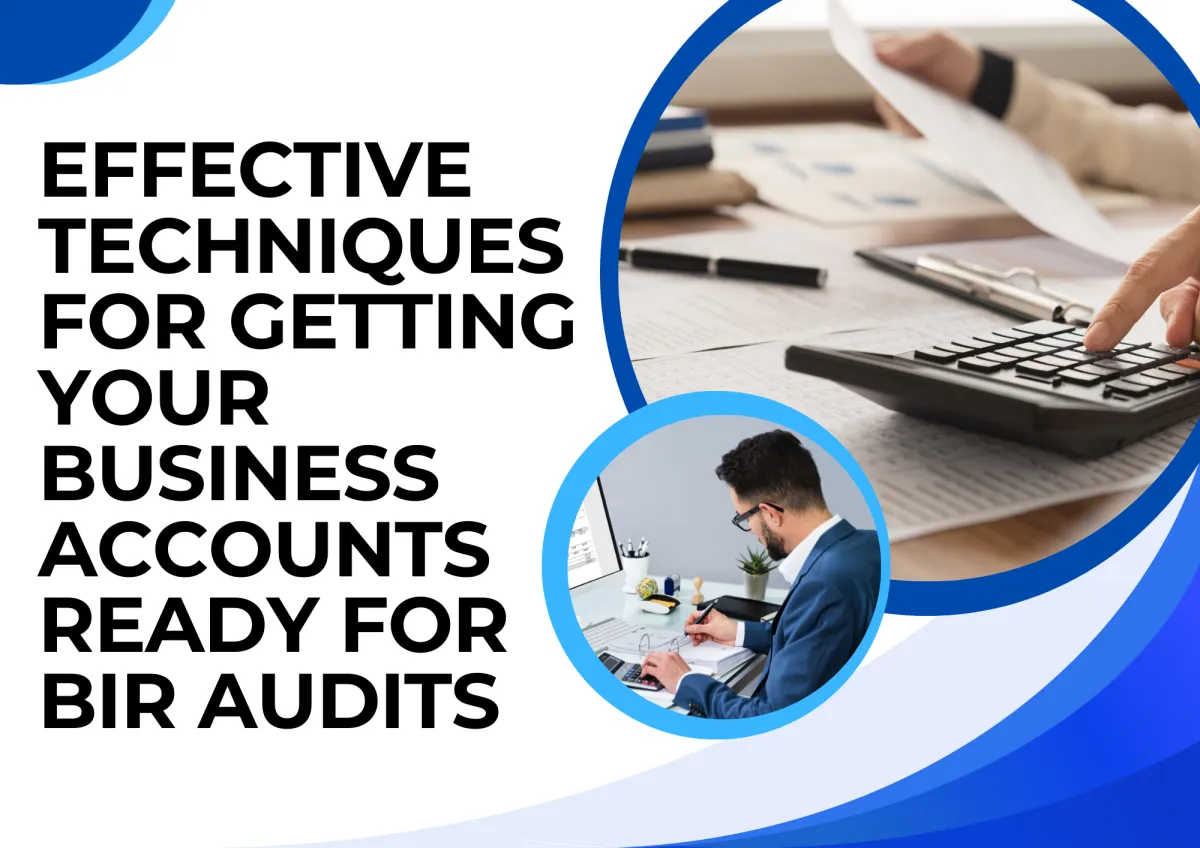Effective Techniques for Getting Your Business Accounts Ready for BIR Audits
It is wise to make sure that your company's accounts are constantly prepared for audits throughout the year if you operate a business in the Philippines. To avoid any trouble during audits carried out by the Bureau of Internal Revenue (BIR), it is best practice to regularly maintain your accounts organized and up to date.
Here are several methods for keeping your company audit-ready all year long, from regularly updating your records to addressing developments since the last BIR audit.

#1: Maintain Good Financial Tracking
You'll save a lot of time and work when getting ready for audits if you keep track of your accounts. It also enables you to make sure that you are informed of the commercial transactions taking place. You may make sure that you are always on top of your accounts by doing the following actions:
• Maintain proper receipt organization and storage. When keeping track of your finances, there are two different types of receipts:
(a) paper receipts and
(b) digital receipts. Paper receipts should be kept in file cabinets or binders for the best storage. Use programs to keep and organize your receipts for the latter, like the FreshBooks App.
• Create a spreadsheet to keep track of your transactions. Keeping track of your transactions is also made easier by keeping receipts. Instead of rummaging through your filing cabinet, this will make it easy to find specific receipts. Categories such as date, purpose, and amount might be included.Keeping track of your transactions and organizing them can make it easier for you to prepare the documentation you'll need for your audit.
#2: Reconcile Your Accounts on a Regular Basis
Reconciliation is an accounting technique that analyzes two sets of records to confirm that the results are true and consistent. Regularly reconciling your accounts can assist you determine that your general ledger accounts are correct and complete.
Reconciliation should be performed on a regular basis, such as quarterly or monthly, to verify that all of your accounts are accurate and consistent. As a result, the likelihood of experiencing reconciliation issues during your company's audit will be greatly reduced.
#3: Deal with potential issues as soon as they arise
Business operations can be challenging since you may not be able to monitor every transaction done by you and your employees in order to keep your company functioning properly.
If you face such issues or discover an unexpected transaction in your accounts, it is best to rectify them immediately to avoid being identified during an audit. You will save time combing through old paperwork to clarify specifics about a particular transaction this way.
It is also advisable to ensure that your firm is in compliance with your covenants to minimize audit delays.
#3: Deal with potential issues as soon as they arise
Your company has most certainly been audited before, resulting in various changes to accommodate the recommendations made in the audit's final report.
When preparing for your next audit, evaluate the changes your organization has made since the prior audit. During this period, you should consider two changes:
Material Changes. These changes pertain to investments in new projects as well as government funds and assistance provided to your business.
Non-Financial Changes. These modifications concern internal control systems and management accounting standards.
Covering every aspect of your company's adjustments will help you offer a clear and accurate record and prevent being noticed during your audit.
BIR Auditing Procedures
The Bureau of Internal Revenue (BIR) will audit your company at random. You would be required to submit your books of accounts as well as any other papers considered essential for the audit. The following is a summary of how the BIR performs audits:
• Letter of Authorization. When the BIR selects your company for audit, you will be given a Letter of Authority (LOA), which gives a BIR Revenue Officer (RO) the authority to examine and scrutinize your books of accounts and other accounting records to determine if you are in compliance with the correct internal revenue tax liabilities. The document will also identify which tax type will be investigated as well as a list of papers that will be required for the inspection.
• Documentation and Subpoena Duces Tecum (SDT). To avoid reaching the SDT stage, which requires your business to submit the relevant documents within a limited time, it is best to send the required paperwork as soon as the LOA is obtained. Failure to comply with the SDT may result in criminal prosecution through action with the Prosecutor's Office.
• Preliminary Assessment Notice. The BIR will give you a Preliminary Assessment Notice (PAN) with the RO's initial findings after discussion and investigation of your accounts. You will have fifteen days after receiving your PAN to file a Protest Letter outlining your reasoning and discussing any problems you have with the PAN.
• Final Assessment Notice. If the BIR discovers problems with your PAN, they will issue a Final Assessment Notice (FAN), to which you must respond within fifteen days to rectify the errors.
The precise BIR process used during your audit will depend on the nature of your case, but it will normally follow this process.
Prepare Your Business Accounts Confidently
To avoid problems during the audit, you must put in a lot of effort and time to verify that your accounting is correct and consistent. By keeping track of your accounts and documents on a regular basis, you can ensure that your company is always audit-ready.
BIR audits can be stressful and time-consuming. If you find the process too time-consuming, you should seek the assistance of tax compliance service providers to help you prepare your firm for the next audit.
© 2023 by Upcloud Accounting. Created by Genuinely Business Solutions.
